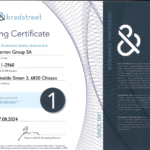WHAT TAX LAW CONSEQUENCES REGARDING BUSINESS TAX ARISE FROM EU CUSTOMS CLEARANCE?
We will try to clarify the tax law consequences related to the business tax of an EU customs clearance based on the following example.
Example:
Swiss supplier A is registered in Germany for business tax purposes and has a German VAT identification number (or alternatively is represented in Germany by a tax representative C). A delivers goods from Switzerland to Austrian customer B via Germany. B has an Austrian VAT identification number. According to the agreed terms of delivery DDP, customs-cleared return(*), A imports the customs-cleared and taxable goods into Germany on its own behalf.
*A bears the cost of transportation and import duties to the place of destination (Austria). The danger of the spoilage or damage of the goods is also borne by A to the place of destination.
Transportation of goods from Switzerland to Germany
There is customs clearance of goods in Germany (release for consumption operation). Since the goods do not stay in Germany, no import turnover tax is levied.
Supply of goods from Germany to Austria
From the point of view of business tax law, A’s supply to B is considered to have been made in Germany, because A is the taxable person for import turnover tax (importer).
The supply is tax-exempt as intra-community to the extent that this exemption can be proven in accounting and documentation. The supply must be declared by A or by C (if there is a tax representative C appointed) in his periodic declaration and in the recapitulative statement in Germany.
In addition, the delivery must be declared in the Intrastat (shipment) form if the minimum declaration threshold, currently (in Germany) € 500’000,- per year, is exceeded.
In the invoice, A must indicate his VAT identification number and that of his customer. In addition, the invoice should state that the delivery is intra-community and tax-free.
The reference to intra-EU tax-free delivery on the invoice (drafted in one of the official EU languages) can be made in one of the following ways (examples in some official EU languages).
- Germany: steuerfreie innergemeinschaftliche Lieferung
- France: livraison intracommunautaire exonérée TVA
- Italy: exempt intra-EU supplies
- Austria: steuerfreie innergemeinschaftliche Lieferung
- Great Britain: zero-rated intracommunity delivery Spain: entrega intracomunitaria libre de impuesto
If a fiscal representative C has been appointed, the following information must also be indicated on the invoice: indication of the fiscal representative, name, address and VAT identification number of the fiscal representative.
Tax on purchases by B in Austria.
B has to pay an intra-EU purchase tax in Austria on the delivery of A. The purchase tax can be claimed by B as purchase turnover tax as part of its share of the purchase turnover tax deduction. B declares his intra-EU purchase in his periodic declaration in Austria and if the minimum declaration threshold is exceeded in the Austrian Intrastat (purchase) form.




